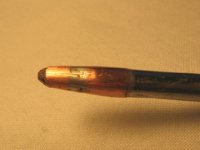Thanks eagle77, hoser, 1privateer and WThesing for the GREAT ideas !

WThesing........I was an avid fisherman from age 8 to 49, at which time my brother Paul invited me to my
first gun show and I became totally engrossed in target rifles and handloading. Now I've added an equally
exiting hobby (you guessed it !)..........Metal Detecting !!!!!!!!!!!! In all my years of fishing it never dawned
on me that cork was a factor adding to the sensitivity of the rod (just hadn't read or heard of this.) This is
an amazing piece of information ! Soooooo, think I'll try adding some cork discs/donuts to the metal rod for
an extra-sensitive handle on my homemade coin probe :!: !!!
I've been wondering whether it would increase sensitivity to use a rod made of a high conductivity metal.
Looking at conductivity charts, silver is the bench mark with a rating of 100, followed on a declining scale
by coppers, aluminum, brass and carbon steel. This is just a basic arrangement and different alloy percentages might cause an alteration in this line-up, but I would think close enough for our purposes.
Another thought (haven't tried yet) would be to use soft copper tubing, which should be highly conductive,
and stiffen it by inserting a brass rod, keeping the inner rod back from the business end of the probe
so that the copper tubing could be formed over the end, sort of bullet-shaped. This could be done
by drilling a co-bore into the end of a short piece of low-carbon steel rod, to make a forming die. The tapered end of the drill should provide a reasonable bullet-shaped end to the copper tubing. (This would be
the reverse of flaring the end of soft copper tubing for an oil line connection.).
Of course, this suggestion is based on the assumption that a metal with good conductivity would provide
some additional sensitivity to vibrations created when the probe tip contacts metal in the ground. Also,
since I'm relatively new to MDing and have no experience using a probe, this whole idea may be superfluous.
I welcome anyones viewpoint on this hypothesis.........even if it's just

LOL !!
In closing, thanks to all for your replies !
Todd




 Try turning down the handle and do a cork laminate. You will be surprised at the difference in sensitivity !!!!
Try turning down the handle and do a cork laminate. You will be surprised at the difference in sensitivity !!!!




 !!
!!